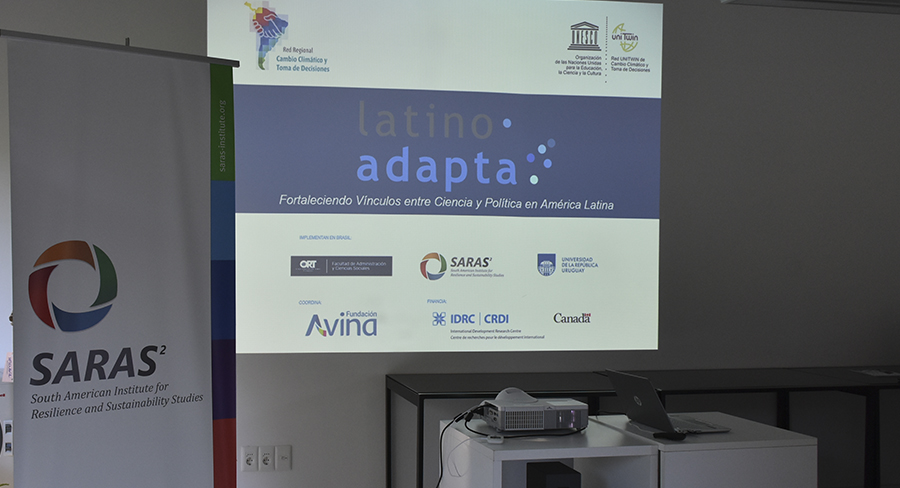How do science and politics engage in dialogue about climate change in Uruguay?

The LatinoAdapta Project continues to drive forward, and in order to respond to how Science and Politics interact, last May 2019 the “II Workshop on Dialogue between Science and Policy in Adaptation to Climate Change” was held at SARAS Institute headquarters, located in Bella Vista (Maldonado).
The LatinoAdapta Project continues to drive forward, and in order to respond to how Science and Politics interact, last May 2019 the “II Workshop on Dialogue between Science and Policy in Adaptation to Climate Change” was held at SARAS The project “LatinoAdapta: Strengthening links between science and governments for the development of public policies in Latin America” is a research initiative that seeks to identify and analyse knowledge gaps that affect the development and implementation of policies and measures related to adaptation to Climate change in six countries in Latin America: Argentina, Brazil, Chile, Costa Rica, Paraguay and Uruguay.
The second dialogue workshop between science and politics was one of the actions of the project in Uruguay, as an initial stage to create a space for dialogue between government decision makers and academic actors to identify research priorities based on information gaps and knowledge identified in the initial phase of the project. The workshop was attended by 15 stakeholders, including decision makers and technicians from government institutions and academy representatives involved in climate change adaptation policies and actions. Participants included government representatives from the Climate Change Division of the Ministry of Housing, Territorial Planning and Environment (DCC – MVOTMA), the Sustainability and Climate Change Unit of the Ministry of Livestock, Agriculture and Fisheries (USCC-MGAP), the National Secretariat of Science and Technology of the Presidency of the Republic, the National Emergency System (SINAE) and the Uruguayan Institute of Meteorology (INUMET). From the science sector and academia, there were representatives from the University of the Republic (Udelar), the National Council for Innovation, Science and Technology (CONICYT), the National Institute for Agricultural Research (INIA), the Basic Science Development Program (PEDECIBA), ORT University Uruguay and SARAS.
The workshop consisted of two parts. During the first part, the discussion focused on the structures, platforms or spaces that exist (or not) in Uruguay to promote an effective exchange between science and politics. Participants discussed on its effectiveness in the design of public policies, in the commitments related to the Paris Agreement, and in the prioritization of research and development areas linked to climate change adaptation. The second part was focused on the identification of possible transforming alternatives to overcome the difficulties and barriers identified. The exchange focused on organizational aspects, financing and incentive schemes for participation.
The work (in groups and plenary session) ended with important agreements reached by participants. First, the need for a space of science-politics coordination with the participation of decision makers from government institutions and representatives from the academy, with the aim of promoting and improving the design and implementation of policies and actions to adapt to climate variability and climate change based on available or co-created knowledge. Secondly, it was recognized the existence of institutional arrangements that can be used to host this dialogue. For example, CONICYT and the Advisory Commission of the SNRCC (National System for Response to Climate Change and Variability). Likewise, it was raised as a possibility that both institutions interact for the search of that space. Third, it is understood that there is no need to create a space outside the existing institutional framework (there are already several interaction spaces and bridge structures). Thus, the need to proceed with the mapping of academic and government institutions that work, research and think about climate change policy, or can do so in the future, was highlighted. In this way, workson the objective regarding the Advocacy Plan for Uruguay begins to take shape.
LatinoAdapta is an initiative of the Regional Network for Climate Change and Decision Making, funded by the International Development Research Center (IDRC) from Canada. In Uruguay, partner institutions of the Network, which are carrying out this project are the Faculty of Administration and Social Sciences (FACS) of ORT University and SARAS Institute.
